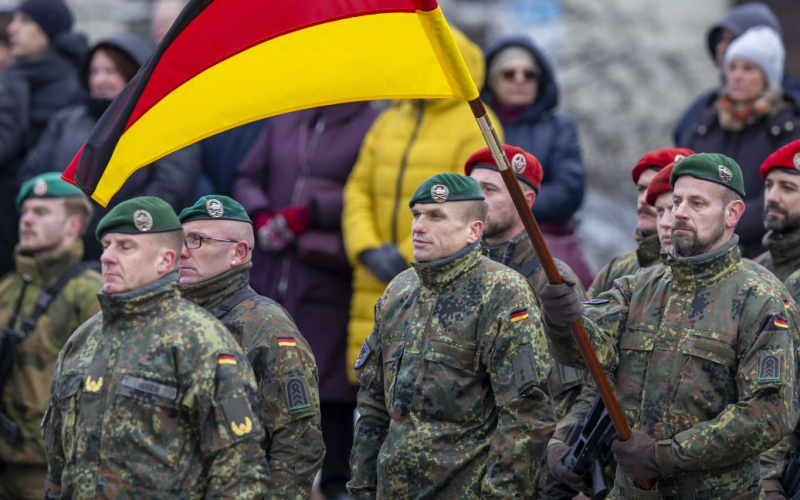
Following Russia's full-scale invasion of Ukraine and concerns over Donald Trump's stance on NATO, Europe is beefing up its defenses to prepare for the worst-case scenario: a direct war with the Kremlin.
European countries are preparing for a potential war with Russia, bolstering their defenses in case of escalation. Lithuania is preparing to replace bridges on the border with Russia to stop the possible movement of Kremlin tanks. In the Baltic Sea, NATO ships are hunting for Russia's “Shadow Fleet”, accused of underwater attacks on communication cables. There are also plans to create a large-scale missile defense system similar to Israel's “Iron Dome”.
NBC News writes about this.
Donald Trump continues to criticize European countries' defense spending, insisting that they should allocate 5% of their GDP, which is more than double the NATO standard. In his statement, he also noted that the United States spends much more on supporting Ukraine than Brussels and hinted at the possibility of territorial concessions to end the war in Ukraine.
“NATO will have to pay more. It's funny because it affects them much more. There's an ocean between us,” Trump said.
European leaders see Russia as an existential threat. French President Emmanuel Macron has called on European countries to take responsibility for their own security, saying Trump's second term should be a “wake-up call.” EU Foreign Policy Chief Kaja Kallas has backed his position, saying Europe must invest more in defense.
Experts also warn that territorial concessions to Ukraine could signal rewarded Kremlin aggression. “This will only increase the danger for the West,” critics say.
Europe Mobilizes: How the West is Preparing for a Possible War with Russia
In the wake of Russia's full-scale invasion of Ukraine and concerns over Donald Trump's stance on NATO, Europe is beefing up its defenses to prepare for the worst-case scenario: a direct war with the Kremlin.
In March, the EU pledged €500 million (about $515 million) to double its munitions production to 2 million units per year. And 22 countries have already joined the European Sky Shield initiative, a continent-wide missile defense system to protect against Russian attacks.
Lithuania, Latvia, and Estonia, which have historically suffered from Russian influence, are actively strengthening their borders. Lithuania has begun building a “Baltic Defense Line” — a border equipped with anti-tank trenches, pillboxes, and concrete pyramids (“dragon's teeth”). It is also planned to replace bridges on the approaches to Russian Kaliningrad.
Lithuania has increased its defense spending to 5% of GDP, the highest among NATO countries. That's well above the 3.4% Washington allocates, though it remains below Russia's 6.2% of GDP.
In Norway, the government has updated the emergency preparedness brochure it distributes to all citizens. This time, the document makes clear the need to stock up on water, food, and other resources in the event of “military action.” While such advice previously focused on extreme weather conditions, the brochure now says “we live in a more turbulent world” and warns citizens to seek shelter.
In Sweden, the church, at the behest of the military, has begun searching for additional burial sites in case conflict reaches its shores.
After decades of peace, Germany has decided to spend 100 million euros to restore public siren systems dismantled after the end of the Cold War.
Despite the increase in defense spending, analysts say Western Europe's efforts are still insufficient. For example, Germany, France, and the United Kingdom are making “small increases” to their defense budgets, while Eastern European countries such as Lithuania and Poland are making large investments in defense capabilities.
Russian Provocations and Hybrid Threats
In recent months, Moscow has stepped up its activities, which has European governments worried. For example, in Finland, underwater cables were cut, prompting NATO to launch Operation Baltic Guardian.
Western governments also accuse Russia of sending incendiary devices to DHL logistics centers in Germany and the UK, which could have caused fires on board planes.
“Europe must be prepared for the most extreme military situations,” said a representative of the European Union.
Political Challenges and Populism
The situation is complicated by the domestic political landscape of many countries. Populist parties, often anti-immigration, often take a softer stance on Russia, creating further obstacles to European unity.
The problem, according to Chatham House analyst Keir Giles, is that “countries further away from Russia still pretend that war is something that happens to other people.”
Read also :
Related topics:
More news

